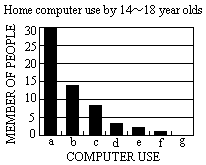题目内容

This reports shows something of home computer use by a group of young people. It is a common idea that children today know about computers and have a good knowledge of using them in all sides of their lives. We decided to try to find out whether this was true.
We asked thirty young people between 14 and 18. All the children said they had computers at home. We asked them how much time they usually spent on their computers in a week, but we were most interested in what they used their computers for.
The usual time spent on a computer in a week was about 12 hours, with the highest user about 32 hours and the lowest user only 5 hours. There was no great difference between boys and girls.
All the children said they usually used the computer to play games. Fourteen told us they did some wordprocessing(文字处理) at home, but not very much. Only 2 of them said that computers helped them with their studies, and 8 people told us they kept addresses and telephone numbers on their computers or used them as diaries. Only 3 people said they were learning to make computer programmes, and nobody looked up databases(数据库) (other than their address lists). None of the people used their computers for any other use. The diagram(图表) gives all the results one by one.
The results show that computer use is quite high among 14-18 year-old children. They also show quite clearly that computers are seen by most young people as little more than games machines. The only other great uses are for wordprocessing and keeping address lists. It seems to us that, though computers are common in the homes of young people, they have not yet become useful in everyday life.
1.In the diagram, what does the letter “d” show?
[ ]
A.3 people between 14 and 18.
B.Only 2 of the group.
C.To help them with their studies.
D.To help them with computer programmes.
2.We are afraid there is one mistake in the diagram What is it?
[ ]
A.the words “Number of people” and “Computer use” should be changed each other.
B.Add all the numbers from “a” to “g”, the number should just be 30.
C.The number of “d” should be higher.
D.There should be not number about “f”.
3.In the report, “little more than” means ________.
[ ]
4.If children could use computers usefully, that means ________.
[ ]
A.children could play all kinds of different games
B.more other databases than address lists should be learnt
C.there would be great different between boys and girls
D.computers would be much more popular
解析:

